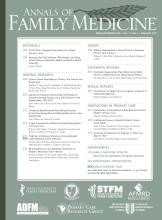The Annals online discussion (called TRACK) interprets, questions and challenges the findings of articles published in the Annals from the perspectives of diverse readers. In this On TRACK, I reflect on what the online discussion since the last issue has taught me, and invite you to reflect on your own revelations.
What I Better Appreciate
-
The rejuvenating potential of bringing an ecological perspective into the consultation room in small ways,1 and the challenges of doing so2,3
-
The complexity and implications of interpersonal continuity of care4–6
-
That people “yearn for a PHYSICIAN who will get to know them and STICK WITH THEM as they reap the benefits of modern medicine applied to their worries, problems and personal health care goals. But they don’t think this type of physician exists anymore, and if such a physician should be fortuitously discovered, people doubt that the current ridiculous health care arrangements in the United States do or would permit them to do their job as a personal physician.”7
-
That despite all the guidelines and emphasis on prevention and chronic disease management, “The prize of office care is attending to the chief complaint, understanding it and seeing it in the context of the patient’s life.”8
-
The largely untapped but rapidly emerging potential of community-based participatory research for addressing some of our most intractable problems9,10
What I Understand
-
The need for more primary care clinicians to perform colonoscopy,11 and the feasibility of adding this skill to practice with a high degree of competence12,13
-
The potential and limitations of unsedated ultra-thin esophogoscopy for screening and diagnosis of the airway, esophagus, and upper stomach14,15
-
The “multifaceted nature of many mental health problems and the need for complex integrated strategies to deal with them”16
-
How the hard-won wisdom of painful personal experience can help clinicians to overcome a “warrior” mentality to develop more mutually healing connections with patients17
What I Grapple With
-
The corrupting influence of pharmaceutical companies’ marketing18–21 and our professional organizations’ dependence on it22
-
The difficulty of an intelligent, accomplished reader in grasping the complexity of research articles that we publish.23 The Issue in Brief feature, accessible from the Annals homepage at http://www.AnnFamMed.org, is an attempt to put complex research articles into context and to make the main findings accessible to a broad audience. The discussant’s call for clear, accessible writing in the primary article, however, is a good reminder for authors and editors
-
The need to move beyond reductionist and mechanistic thinking to fully make use of the wisdom in the biopsychosocial model24
What I Learned About
-
Successful efforts to increase communication between complementary and alternative and traditional clinicians25
-
Three categories of research: fundamental, strategic/developmental, and evaluative26
Useful Web Sites I Found
-
Avoid being bought by pharmaceutical companies at: http://www.NoFreeLunch.org18
Community participatory research9,10
AHRQ Evidence Report “Community Based Participatory Research”: http://www.ahrq.gov/clinic/tp/cbprtp.htm
NIEHS Community-Based Participatory Research: http://www.niehs.nih.gov/translat/cbpr/cbpr.htm
Community Participation in Research (PAR-05-026): http://grants.nih.gov/grants/guide/pa-files/PAR-05-026.html
NCMHD Community Participation in Health Disparities Intervention Research (RFA-MD-05-002): http://grants.nih.gov/grants/guide/rfa-files/RFA-MD-05-002.html
I’m Looking Forward to Authors’ Replies to These Concerns
-
The association of transferrin saturation, dietary iron intake and cancer risk27
-
How researchers studying cognitive strategies of physicians figuratively got into the heads of their study participants28
-
The analysis methods of a study of patients not accepting the diagnosis of depression (questions raised by medical students using the article for a journal club)29
This is my personal list of learning from the recent online discussion of the Annals community. What is yours? Please join these and other readers in adding your insights at http://www.annfammed.org. Click on “Discussion of articles” or follow the links for the comments or the article on which you wish to comment.
- © 2005 Annals of Family Medicine, Inc.







